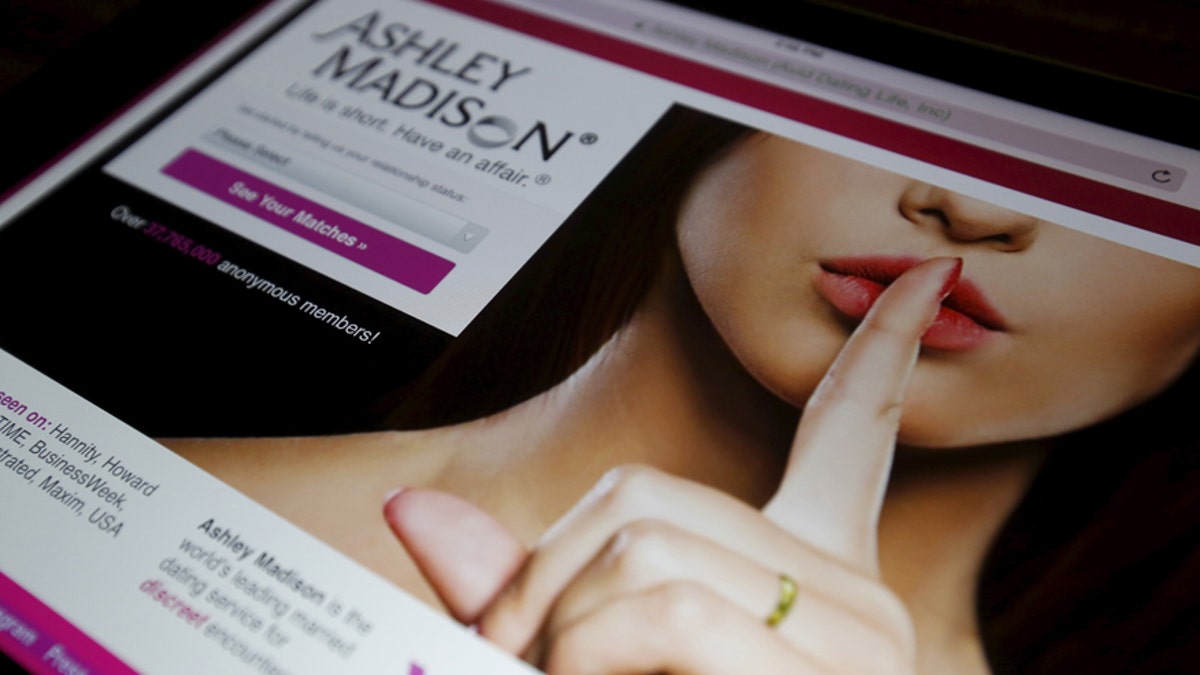
The homepage of the Ashley Madison website is displayed on an iPad, in this photo illustration taken in Ottawa, Canada July 21, 2015. (REUTERS/Chris Wattie)
On the Internet, it turns out people do know you're a dog.
That's the new reality now that hackers have broken into the adultery website Ashley Madison and exposed the personal records of millions of people who’ve been looking for love in all the wrong places.
Ashley Madison’s Toronto-based owners are facing multimillion-dollar lawsuits from customers who say the site did not delete account information it said it would. But that won’t make life any easier on the home front, because once the genie’s out of the bottle, there's little chance of getting it back in.
Anonymity is no longer the norm online. Private photos go public. Politically incorrect posts torpedo careers. Even the sine qua non of privacy, the IRS, has been extensively hacked. We now know the agency had some difficulty with numbers when it announced that hackers had stolen the personal information of 114,000 taxpayers earlier this year. Now it admits the number may be closer to 334,000.
Uber knows where you've been and where you're going. Amazon knows everything you've ever considered buying. Google knows what you read and watch. Facebook knows who your friends are. And hackers and marketers can cull the rest.
Related: Canadian police appeal to Ashley Madison hackers to help in possibly-related 'suicide' investigations
So is online anonymity dead?
There are a few lessons to be learned from the Ashley Madison fiasco. The first is, don't use your work email address for, ummm, personal business.
The second lesson is that hackers come in many different forms. It's not just teens pranking websites, Russian gangsters collecting credit card numbers and Chinese spies phishing for weapon blueprints. Anyone – from former employees to those irked by the lack of potential female partners on a website (Ashley Madison has been accused of posting fake profiles of women) – can become a hacker
The third lesson is that there's no such thing as the Dark Web. While some sites may not show up in Google listings, that doesn't mean they can’t be easily discovered. Hackers regularly trade stolen credit card information, Social Security numbers and birthdates online. BitTorrent users around the world trade everything from old episodes of “M*A*S*H” to the latest movie blockbusters. And anyone using a Tor browser can uncover a wealth of information that’s “hidden” on the Dark Web.
Related: How to check if an account was exposed in the Ashley Madison hack
So if you think your Tinder hookups and sexting history have evaporated into the ether, think again. It's probably only a matter of time until someone exposes that information too.
Some say the end of Internet anonymity could have an upside: a renaissance of civility and politeness. People would have to be accountable for their obnoxious comments and behavior online. It might even reduce the corrosive effects of nasty cyberbullying. Indeed, even Icann (the governing Internet body) has proposed making every website owner's personal information public. The idea is that each site would provide a direct contact address for registration records. Every site, essentially, could be held accountable for its content.
But there's a dark side to such transparency.
Privacy advocates have pointed out what will be obvious to many victims of cyber-based crime: Posting such personal information can put people in physical danger. It would make it much easier for criminals to “swat” people, making false distress calls that send SWAT teams crashing into innocent family homes in the middle of the night.
Related: Hackers say they've posted data of adultery website Ashley Madison users online
There is also the very real danger that a lack of anonymity online could stifle political dissent, silence whistleblowers and allow marketers and commercial interests to pry into every aspect of our lives. Forget about the Bork rule; every book you read and every video you watch would essentially be made public. And remember that in many countries, criticizing the government won't get you elected. It will get you arrested.
So the issue is not about hypocrisy or covering up for the likes of the Ashley Madison victims. The issue is about protecting privacy while promoting responsibility and accountability. After 20 years of Internet expansion, that's proving to be a trickier balancing act than ever.




















